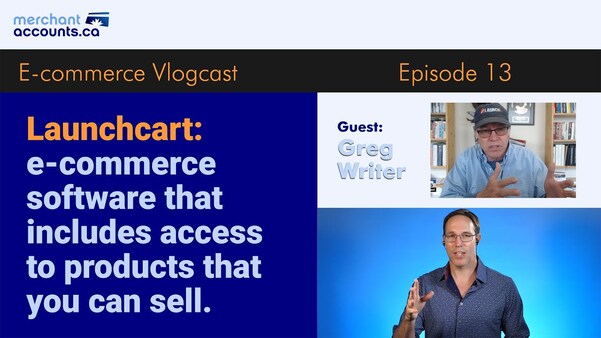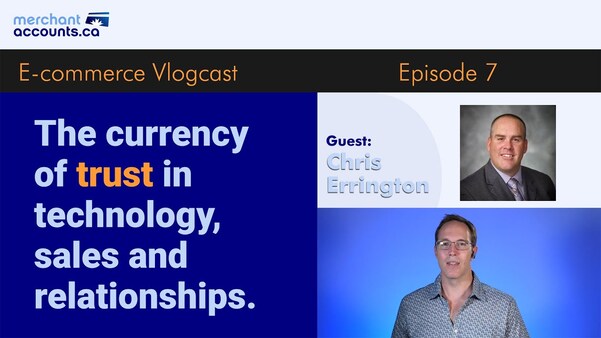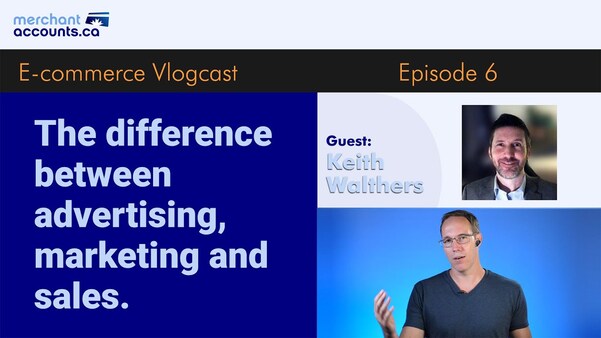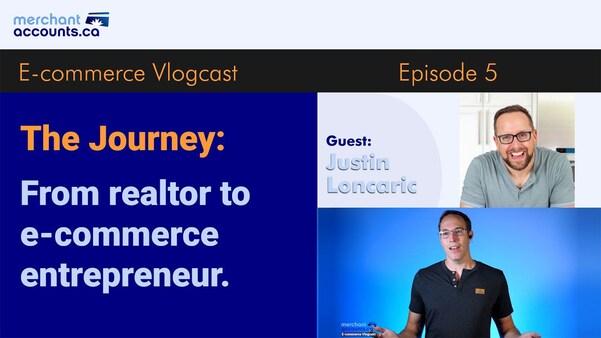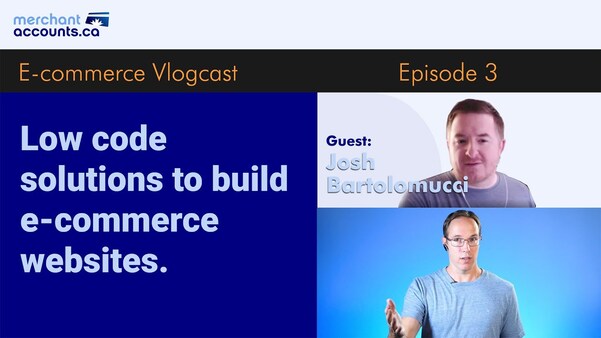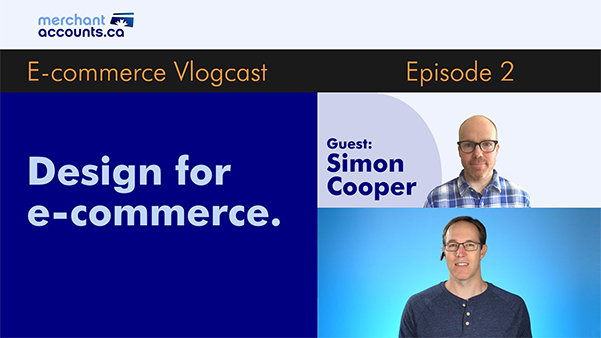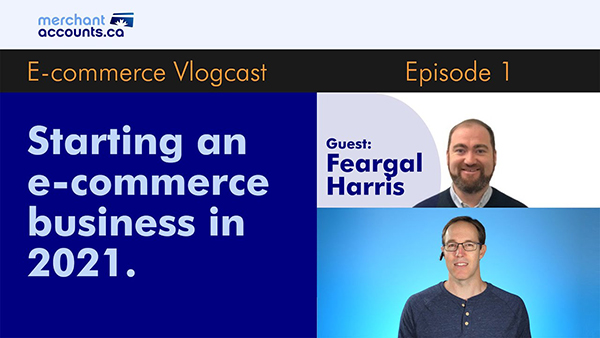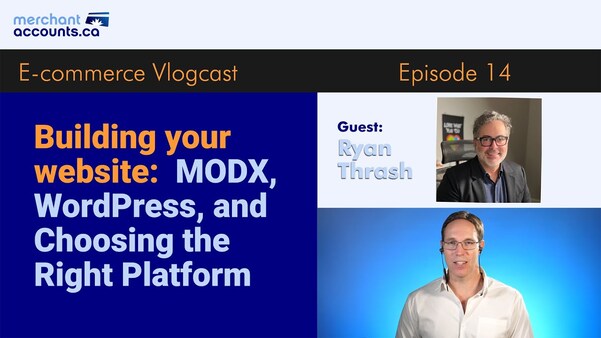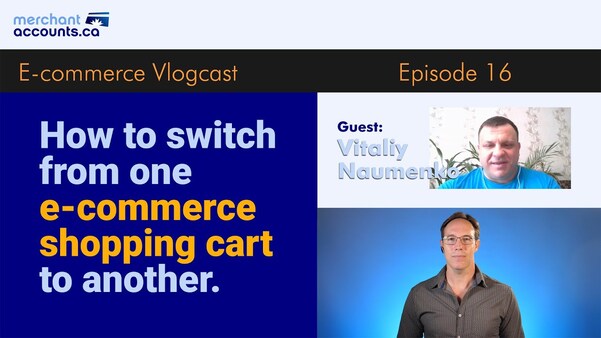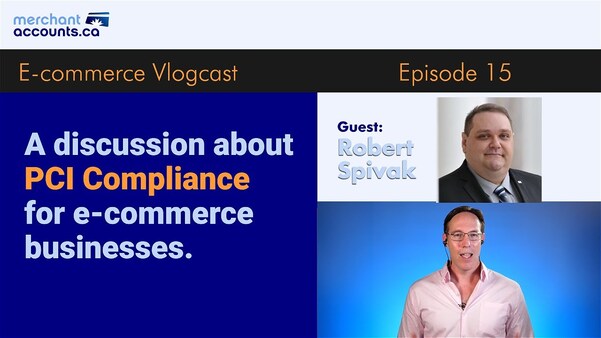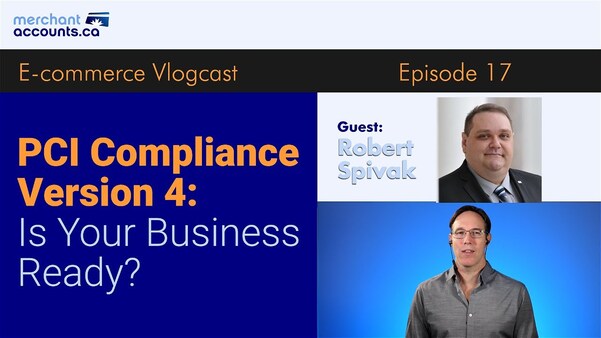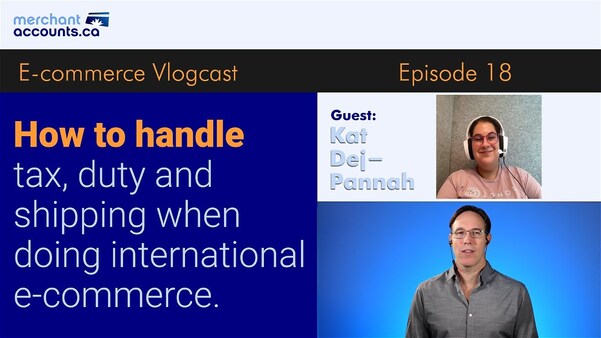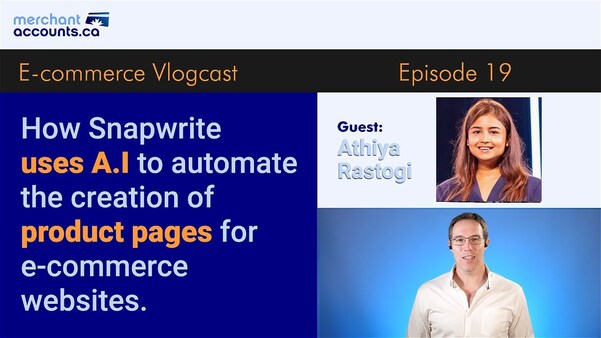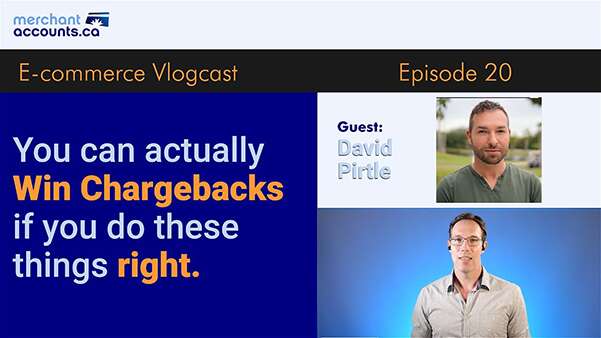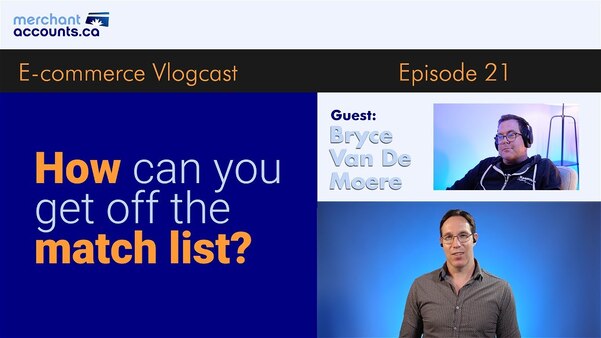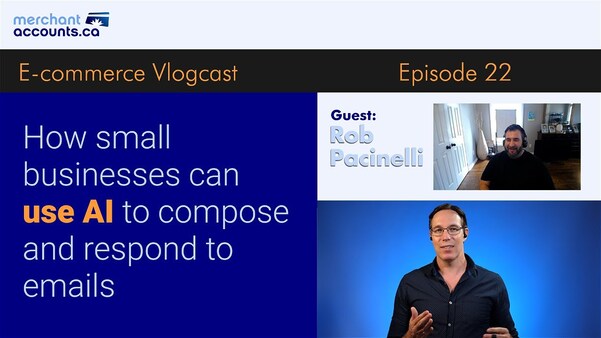February 28, 2023
by David Goodale
How is AI Changing E-commerce?
(Slightly edited from video transcript for greater readability)
David Goodale:
Hello, David here at Merchant-Accounts.ca with another episode of the vlogcast. I recently found out about chatGPT, and it blew my mind. It's blown pretty much everyone's mind who's found out about it. I was thinking about AI and how it's changing everything and e-commerce is probably one of those things. I have to admit, I'm not an expert at all in AI. I figured if I'm not an expert, I should probably become at least knowledgeable. Today I'm talking to Wojtek Hoch. Wojtek is a founder of a group called Connection. It's a group of engineers and developers and experts that provide digital solutions, both on the hardware and the software side. Wojtek has a broad range of knowledge, not just in ex in e-commerce, but AI web development. I thought you'd have some great insights into this discussion. Wojtek, thanks for joining today. Yeah.
Wojtek Hoch:
Thanks, David.
David Goodale:
Awesome. I mean, when chatGPT came along, it blew my mind, but is that for people that don't know about AI, has this been coming for a long time and just it wasn't really in the public eye until recently?
Wojtek Hoch:
Yeah, the development of artificial intelligence started in the sixties. Oh yeah, started way before. If you look at, Odyssey, if you remember having, there's a now flowing, flying around and providing a device for robotics and artificial intelligence started away back then. The fascination with that is ongoing. The main principles of developing it's hinged on how much data do we have. It was a, it was a sort of, there's a threshold at which point we had enough data, but we didn't have enough, computing power. Now we have both we can use. Now we can take this data and do something with it. It's not new but hasn't been particularly useful in people's minds because, it's very esoteric terms like wire artificial intelligence.
Wojtek Hoch:
Well, what does it mean? Show me. Mm-hmm. There was nothing in very simple ways to show. Now nowadays, for example, as of last month, if you take a chatGPT you can tell it Hey, write me a poem about bikes, and it will do that for you. Then reasonably well, and then us mm-hmm. Get more sophisticated, and using different prompts and so on, you get much better results. Now we have something tangible that you can see and, literally it says, holy, but this thing wrote it for me. That's why I think now it's, you have evidence of something cool. As you said, the majority of people just don't understand how and what, but mostly they don't care. It's well, this works. As this is artificial intelligence, this is fantastic.
David Goodale:
I'm noticing that a lot of people's reaction to it is fear, because, I showed it to my dad. I showed it to my mom. Of course, people's minds just go to Skynet. But and I said to them, look, technology can be used for a car can be used for good or bad things. It can be used to transport, things across the country. It could be used for really bad things too. It's funny, when you were chatting and you were talking about how it can write a poem. I remember when I was 13 years old or whatever, I hated typing. I didn't know how to type yet. I had this dream, imagine a computer where you could talk the words, and then it would like to record it onto the screen.
David Goodale:
I wasn't even thinking big enough like now it's like I don't have to talk to words. It's hey, chatGPT, just write me an essay. You know, it is just, I think for the layperson, like somebody that doesn't know a lot about this stuff, it's so much better than what I assumed it would've been. It's just caught means probably a lot of people are unaware. Maybe you look at it and the boundaries of it, like what it can do and what are its limits. To people that are the great uninitiated, its boy, is this going to take my job? What? Like, where are the limits on this thing?
Wojtek Hoch:
Well, ha you have to look at maybe generationally. First of all, people usually fear the unknown. Therefore, you have something that, is very difficult to define. Well, this thing sits on my computer. Well, no, it's cloud-based. What else does that mean? Then try to explain to people that cloud computing is very difficult. Then therefore it's okay, we don't fully understand this, so we have a choice, right? We embrace it and use it, or we fear it because we don't fully understand it. I think in older generations, people were not as easily accepting of the technology, of things unless they had a fairly good explanation of how that works. Give you an example. As you have, your average teenager, using the phone, pretty much twenty-four-seven without really fully understanding how the hell that happens.
Wojtek Hoch:
Mm-hmm. Yes. You can do the TikTok videos. You can post, and you can do whatever you want, but you don't care that much about how that happens. Whether, I think a lot of people in the past we'll say, well, this is amazing, but I really kind of like to know how this happens. It was probably a reliance, on technology. You know, let's say you're driving a car with car brakes, then you have maybe some semblances of what might have gone wrong. Maybe you can repair it, ask the car, progress. It gets very difficult. Like, well, your Tesla dies. Well, good luck, but not much you can do yourself.
David Goodale:
Oh, my dad's a mechanic and he will often complain that you can't fix cars anymore.
Wojtek Hoch:
No, you can't. It's either replace it or, there was just will take way too much training for, for a mechanic too, to be able to do it all. Mm-hmm. I think this happens with AI too. Like, we have this set of tools and it's, and it's, and it's, the multiplying and rapid pace. We have, the response of chatGPT, Google now all of a sudden has their versions and, Microsoft bought into chatGPT. There is, there's a host of other things. I think all of that, it's critical mass. You know, you think about it this way, right? We rely on large data sets, massive amounts of data, to extrapolate meaning and things like that and then by opening up to everybody, everybody started to play around.
Wojtek Hoch:
It's learning and it's learning at a massive rate. Therefore, just getting better and better and better. Just think, AI learning, let's say image recognition, Google is fantastic at that. Then how they learn is by providing you a captcha, those four squares say, hey, if you want to go forward, you have to recognize what this is. This is a learning algorithm. If you see a picture of the cat and, and it's so you click on and it's cut, excuse me. That it's called human in the loop. You humans, millions of people, millions of humans verifying what Google thinks this image is.
David Goodale:
We're teaching. AI needs us to teach it.
Wojtek Hoch:
Oh, yeah. It's not self-learning and I don't think, it will be self-learning for reliably for a long time. Right? You, the holy grail of AI a general artificial intelligence, meaning that something that would think for itself and, the advent, of quantum computing, that's maybe would be possible, but I think we prefer distance away from that. I think we, are interesting. It should, so, we have it as fantastic tools, and I think we could look at, we got 'em. What do we do with them?
David Goodale:
Well, that's okay. Well, that leads me right to one of my next questions here. I was wondering, is AI too early? For most people? I, you know what, this is such an interesting discussion. This is technically an e-commerce vlog. We can go anywhere, but I'm going to try to steer it toward e-commerce.
Wojtek Hoch:
Whatever was the segue to e-commerce? Yeah.
David Goodale:
Okay, there we go. Is it too early for most people, and I'm not talking Amazon, sure they have unlimited resources, but a small mid-size e-commerce business, should they even be thinking about it at this point?
Wojtek Hoch:
Well, a hundred percent. Give you a very easy quick example. Let's say you're building a site that has, I don't know, five, 600 products. To provide these products or more, right? You have to reliably have an image or set of images for those products, and you, have to have descriptions and maybe some features. Well, what if you cannot easily source that from somewhere? Then what do you do? You know, how, so you're going to sit there and, take images of 500 products or a thousand or 2000 or try to source that out, content. It's difficult to do. It's doable, but it's difficult. You know, in the past we had, we had like Amazon the service called Mechanical Turk that imposes hundreds and hundreds of thousands of humans to do maybe right.
Wojtek Hoch:
Two or three lines of something, right? It would be human labor. Now we don't need to do that, for example, again, another example would be you have several products and you can, add titles to those. Then, great. Then, you tell, you set up the program to, reach out to, AI chatGPT or alternative ones. It's great, based on this, here are some basic prompts about this category and so on. I'd like to have up; product descriptions and we'll write them for you. We'll reiterate several products and we'll; we'll do that. We literally, we just did that with a client. Wow.
David Goodale:
It's almost copywriting. It's a small segment of copywriting.
Wojtek Hoch:
It is copywriting, it's very much copywriting. It's a, it's a copywriting. Imagine this. Now you have a set of products written, very generic, and you have, AI attached, to the products. on the other side, on the front side, on the, on the customer-facing side, it's you are learning more about the customer, customer, some on the rise in the site. It goes to the site. We know what the clicks are, what they read, how much time they spent, per page, and so on. Maybe they searched, so we know what they search for. Then once they land on the product suggested by the AI, we can rewrite the content so there is more relevant to that person in real time.
David Goodale:
What, I just want to make sure, that was crazy, you blew my mind a little bit. I'm going to reword this back. The server is seeing where you go through the website, it knows roughly the copy that you've already scanned and read and the pages that you visited. you visit another page, and it's going to try to perhaps out of a catalog, present items that it knows you're more interested in.
Wojtek Hoch:
That's already done, but I'm thinking a little bit further. As you, because let's say you arrive, in the shop right from somewhere mm-hmm, right? We know where to refer, so we know where it came from. hey, we know more or less what your IP address is, maybe where, and got to identified who area you live in. Based on that, we have some very basic demographics. Therefore, if we have some basic demographics, you end up on a site, and again, you go, there's a set of variables that we can apply and look at how much time you spend per page. Then we customize the content, meaning the language, and how the product is presented to you, that fits your buying profile better. In the background, the more time you spend on the site, the more we can create a reasonably good, picture of who the client is.
Wojtek Hoch:
Then we can either suggest things for you, to set up the customer journey that fits your personality better. ultimately, as you go deeper through this, then, we can get sophisticated and maybe find out, if there is a piece of you left at the decision, well then, we can find things about you that is not a, Erie or creepy thing. Like you, you have a presence on the web, whether it's LinkedIn, Facebook, Instagram, or whatever, right? We can glimpse, your personality from them, and you can learn from it. Then the wording of the title of the product or wording of the product description could fit your buying profile.
David Goodale:
That, that's so interesting to me because I do have a background in, in internet marketing, and I'm not a copywriter, but there was a time when, I did a lot of that many, many years ago, and I always, and it's, maybe it's because, jack of all trades, master of none. That would be a good way to say it. The point that I'm going to make is if you're selling a service, usually there's unique, your unique selling proposition and you born less know who your customer is. At the level you're talking about, I think what you're saying is it's like almost the psychology, college of it, psychology of it. This person would react better to, is it like this person will react better to a fear-based sales message. Like, act fast before times run out? Or is that, is that what you're talking about?
Wojtek Hoch:
Yeah, even deeper. I mean, just the language of, the product description. Let's say if, like if you think of, if you go to the store, right? Really good salespeople try to try to match your personality. You know, if someone goes by pair of skis and, and you know they're beginner skier, well there is no sense of you talking about, features of the skis and, ratings and, and tensions and whatever. It doesn't matter to them, right? you would talk to them. Yeah. you would talk to them, hey, you know what, how, what do you ski? Oh, we skied Ontario. Like, well, we're sorry for you. At the same time, it's I think, what kind of snow is it? Well, I don't know, just kind of those hills. All right, well, okay, cool. We'll get that. You know what, here's, I think that you'll enjoy this ski the most straight east, whether that, the avid Let's eraser comes in and he goes yeah, I am competing and this is, this is how much I weigh. These are my boots. you'll fit that so your presentation becomes custom fitted to the person.
David Goodale:
This, if that makes complete sense, I can wrap it into my own business. Merchant-Accounts.ca. Someone doing their first e-commerce website needs to know what a payment gateway is. They need to know what a merchant account is. If it's absolute's, a big bus. Yeah. If it's a big business, it's what currencies can you do? What are the rates? Are there minimums? Now I get, here's, okay, here's a question because that's so, okay, seemingly absurdly sophisticated to me, but maybe it's not. how achievable is that for a small to mid-size business? Because I feel like it's not.
Wojtek Hoch:
It's getting very, very close to it. You know, we talked earlier about generating content already with a product description, so you could do this. It could be, let's say we do it on, on, on a very simple scale. You have a product that has, let's say two distinct product descriptions. A new, a new, a new tag, one is sophisticated, and the second one is simple. Now you have two, right? Then, so, they could be very easily achievable. It could be just, added somewhere in a mix that you, you generate a heat map or generate very quick analytics because those analytics are already available, right? They can see, okay, this person arrived, my homepage spends about 30 seconds here, or the pause mid, mid-page. They read that paragraph and then they did the search for this and this.
Wojtek Hoch:
All right, cool. having just maybe, and it could be very simple, like almost like a scoring application. If they spend X amount of time on you, on your page, that equals one or two or whatever. If they click on this, and this equals three, so now you have a total number that could be between let's say five to 10. Then, and then, so the logic is if this customer spends, this is their score at this any given time, and they go to the product, we'll present them the product there is based on the score. Does that make sense?
David Goodale:
Well, it makes sense. Yeah. you describing an algorithm, is this something that your company would do? Is that the type of work? Before you even answer that question, I just want to make one point. I get a flat tire, I need a tire, I know where to buy tires. I feel like this is so complicated that when you answer, maybe you could tell me I wouldn't even know what to search for. Do you know what I mean? how do your clients even find you?
Wojtek Hoch:
Find me personally?
David Goodale:
Well yeah, how do I even get started?
Wojtek Hoch:
Well, we've been, we've been very, we've been very, lucky too, to work on, on our reputation in word of mouth. And we did, some, some very large projects, and then our reputation spreads through that. We also worked on smaller ones. The people just sort of said, this is interesting. I, to engage. It's a lot of it's a referral. I think most sales and non-scalable sales are that way.
David Goodale:
Because you built something for someone else, maybe a little bit of leveraging AI, and someone they know sees what you did. It's boy, that sure was cool and they want to.
Wojtek Hoch:
Mm-hmm. Yeah. A lot of it is, it just literally what are we just doing? Right? Talking and then, and you get excited about this and it's, and then you can get other people excited about this and they go, well, this is cool. Then it comes to think of it, I really would like to have something like this in my store. Okay, well let's look at actually, in fact, that's how a lot of our engagements happen. You know, we start talking about what's possible, how could be, maybe optimize your sales or maybe create a funnel better or generation, what would that be like an intelligent recommendation. Then we talked about all of that. This says, well, the people get into this. It's yeah, we like to explore this. This is just, this is just a, just a very tip of what we do.
David Goodale:
It's fascinating to me. I'll tell you. I don't know if you know this, but when I was ever since I was probably about 14 years old or so, I used to write electronic music for, for many, many years. I used to use something called a tracker, which is the decimal-based way that you sequence samples. The long to short though is when I was young, I had no money, no gear, a pile of very poor-sounding, eight-bit samples, and wild creativity. When I'm older, I can afford any trinket that I want. You know, I don't have the time like how used to, but I have unlimited sounds to pull from. It's like an artist. It's the constraints I feel that drive creativity. AI to me feels a little bit too much of a blank white sheet of paper. It's what do you want to do? Like, how does someone know? It's just.
Wojtek Hoch:
You know, what happens? I think a lot of times the deal if you have unlimited options, you choose none. You know, it's an outcome razor principle, right? If, or, or Hicks law, which is, stipulates, if you give somebody more than three or more choices, the chances are off they make an actual choice of slim. I think it's; you know as you talk about the mental journey, which is image generation. That's one of many, right? One, one of the really good ones. I was just playing around as we were before our chat and I thought, product, product images. What if I want to create a product in an image based on the title? I did, it blew me away because it's actually almost exactly what the product is other than, text on it. It was just incredible, you know.
David Goodale:
You just thought, made me think of something Wojtek. You're generating images almost in no, maybe not in real-time. even if you're not, that'll come, right? Eventually.
Wojtek Hoch:
We lose it all the time. Yeah.
David Goodale:
Is it so it's this is something that, that I just thought of, right? I'm doing the podcast with you today. I got up, I got to, comb my hair, I got to iron this shirt. Now, if I, let's say that we're talking about interchange or something more fixed in time. Hey, the rate, to process a visa card today is 1.6% or whatever it is, right? Mm-hmm. Then I want to go back and edit that video. Good luck, because maybe I spilled barbecue sauce on the shirt and it has a stain. Now you can't fit it in. With AI it would make video and audio malleable in the same way text is. That's a little bit of crazy thought to me.
Wojtek Hoch:
That technology's already available. That you can, you can create the video, video from generated by several prompts. You can, you can just develop a video. You set up a story and there are several other, companies that do this. Then that's exactly how it'll work. It's URI.
David Goodale:
That, so how many people, I was going to ask this question later, but I just can't wait. Should people be afraid of AI taking some of their jobs? Or, and I'm going to qualify that one a little bit further because it says, E-commerce focused for folks like me for e-commerce business owners, copywriters, artists like e-commerce adjacent professionals, which I, by the way, I would consider you as well, then, is this a is this good or is it, is it going to be a problem for some people?
Wojtek Hoch:
I always tell the story of old pipe fitter. You know, I was afraid that everything is changing how the heating equipment works and everything else. Then he was afraid that what's, what's going to happen to me? I am no longer relevant. It to me is well, you chose not to be relevant and you have a vast amount of knowledge about your field. Then, but your application's very focused. So not a ton of effort, but you can apply that vast amount of knowledge to, scale your business, to provide the services in a little different way. I think you have to, you have to look at common, maybe an uncommon way, so you have a copywriter. The skill now is it's I mean, you still, so inherently, you know what the good copy looks like. You know what, what headline looks like. You know, what if it will work or not? having that, now you have a set of tools that allows you to be wildly creative and use incorrect prompts, which, is a bit of a learning curve. you can do that, and all of a sudden you can generate a copy faster and you can reiterate faster.
David Goodale:
This is a tool to be used not just by programmers. It's yeah. Artists could take, could take inspiration from it.
Wojtek Hoch:
Exactly. Yeah, so, I don't think it's going to change. I don't think it's going to eliminate the jobs. It will eliminate jobs. If people say, oh my God, oh my God, I'm going to be relevant, therefore is going to shut down. Okay, well, it will happen.me people will not be able to trans, maybe learn new skills or just not willing to learn new skills. It's generally easy to complain that, to bands. It's, think of it this way, right? Like, we're talking about mechanics. It's so the skillset is changing, but it's not being eliminated. You know, I no longer, a lot of people maybe no longer, able to, troubleshoot and, and fix the internal combustion engine. Well, that's okay. You know what? If they have an ability and other program tools that will fix that engine for you, right? Either way, you achieved the goal but maybe applying your skills differently. That.
David Goodale:
Is true. It's basically you're, you're saying be willing to, I think I think you're making two points. One, be willing to adapt because that's important. It's like a necessary life skill. You want to be set in your ways, you can be set in your ways to, your grave, but it doesn't alleviate make for a very happy life. You know, and, and the other one is learning how to use those tools. They can be most often a benefit. You just have to learn how to do it, and how to take advantage of it, which might require some creativity.
Wojtek Hoch:
Yeah, and again, it's, to some, it will become overwhelming because there's just so much there isn't, for, for, and we just basically, don't even scratch the surface of the topic of AI and e-commerce and is applications, which I think we should talk about next. It's, there was, there was, you have something, it's called the internet, almost infinite access to information. You know you search for something if you know how to search, well, then you can find the answers. Then, let's say if you go YouTube says, hey, show me how to do X. Well, yeah, we got 150, 200, and thousand videos tell you how to do it. Okay, then it's totally up to you. Then it says, okay, well I'm going to watch 'em all. Then you have an exact picture of how to do it, or you going to maybe watch five and extrapolate from that. here are the best cases, this the worst cases, best for me to follow this, then try it. Then if I get stuck, I will ask again.
David Goodale:
Maybe there'll be a cottage industry or an industry of people that help other professionals learn how to take advantage of it.
Wojtek Hoch:
Ai. It's already there. If you go, we go on Twitter and there is, God knows how many hundreds of people saying, well, chatGPT is on fantastic things. Unfortunately, corporations miss 87.2% of it, their potential. You know, sign up here and we'll send you this limited 275 prompts. You can use it better. To me, and it's, and it's kind of humorous because, to me it's like anytime you see a seminar or a webinar or any type of, information, sales that say, you know what? I figured his way. I am just so great. I figured out that I'm going to give it away. Sign up. Really? Mm-hmm. What the hell did you want to always all of a sudden give it away? I think that took you years to develop and you've benefited from it. I don't believe that altruism is that way. I think it's, there is, people, put together these prompts, put together this, this series of things, how to do it and, be upfront about it. Look, I figured it out. I spent the last two years working on it. I am good at it. I'll teach you how to do it. Pay me for it.
David Goodale:
That makes sense. Be refreshing. Well, that does make sense. When you were speaking, you reminded me back in the day, like in the Alta Vista days, like in the old, maybe pre-Google or even when Google came around, its companies be pay us $500. We will, submit you to the top 1000 search engines. It's well, can you name more than five? Right? Yeah. I think there will be the good people and the, and the not-so-good. I also think this is funny because so far in this discussion, every time that I, have some vision, so be clear. Oh, they did that a month ago, it's just moving so quickly, it's blowing my mind. It is, I'm going to ask you. I like this. I better just hand the torch over to you and let you run with it. Because what's the most interesting thing or the most interesting use of AI in eCommerce that you've seen or heard of someone doing?
Wojtek Hoch:
I, okay, so you have a, you have a, you have a few branches, right? What are we, what are we mostly talking about, I think it's most apparent to a lot of people's generative ai. We generate content, whether it's copy, or, images. Conversely, judge UDP actually can be used to write code. It's pretty decent. Someone says, hey, write me a plugin for WordPress that does this and this and this, and it will do that for you, and you can test it. It's amazing. There are several things. Since January of AI then there was, there were other fields, for example, hyper-automation, which relies on two. What hyper-automation is, rapid processing of complex documents. Imagine that, in your business or payment business you have, you need to set up the payments for somebody that somebody will have to send you a set of documents that will comply with certain things.
Wojtek Hoch:
Well, the corporate registration versus, bank statements or whatever is that you might need, that will vary greatly what they look like. So, typically you would have to process it manually, try to understand what's on 'em and how they fit, and then, and then, make a decision based on that. What hyper-automation or otherwise intelligent document processing works? It's AI train document recognition. You upload one, set of documents. You might have 15 different types of invoices. We'll recognize this if yes, we uploaded an invoice. Those are the main fields; this is how they map to something else. We'll streamline your business, for you. If you're dealing with, multiple vendors or multiple, systems and if you don't have full-time accounting stuff, looking at an invoice, trying to transcribe these, well then upload bunch, train 'em for a little bit.
Wojtek Hoch:
Design a model. Yes, we deal with, a coding industry, this is what the invoices look like. Those are the fields. Next time somebody uploads, an invoice to be scanned and added to your accounting, we'll just do it automatically. Boom. Just saves you a ton of time. That's one of the things that, AI will help immensely. Then, for example, one of the things, one of the companies I work with, it was, it was amazing. Think, think of it this way. Another, another, another, idea or use of AI's catalog. A lot of sites depend on, on the, on having proper catalog, and then you have the classified information. Let's say you have a catalog, for a clothing retailer, excuse me. They might have two, 300 different brands.
Wojtek Hoch:
Each brand might have thousands of different, pieces of clothing, suits and pens and whatever. Try to imagine that, that somebody would have to classify an image, oh yeah, this is a female five foot eight, 130 pounds wearing a pantsuit made of, 30% wool, 20% rayon, and whatever else, and this is a fit, and so on and so on. you kind of have to, someone has to do this, right? Then, and then, and then sort of catalog has to be active. Imagine that, that we have, AI-driven image recognition and a classification added to it that let's say a vendor applies a thousand images of models wearing clothes. Within minutes or seconds, maybe depending, on the computing power, all of a sudden, those images are classified, meaning they are divided, but male, and female. Mm-hmm, approximate size, the height, the weight, approximately, the size, of the garment. We can recognize the cut of the garment. Was it, Tom Ford or, or Prada, what the fabric might be, depending on the leg of the person? All of a sudden, you're creating a catalog just by uploading an image.
David Goodale:
Wow. That's you mean like you can, you can upload some and then it can generate more, maybe it can generate alternative colors for.
Wojtek Hoch:
The, well, you can generate more, more, and more importantly, can, can rip right through images, recognizing who they are, what they are.
David Goodale:
Oh, and create the whole page.
Wojtek Hoch:
Create a whole page. Further to that, just create the entire catalog with automatically generated, variables, right? Let's say I have, have a, I have a picture, or I have your picture and I'm not telling that, my computer, what kind of shirt you're wearing, you know how tall you are, what size you are, any of that, right? They upload the picture, to the catalog, and all of a sudden, this system will take it. It says, okay, this guy is approximately six foot tall, roughly about 175 to 180 pounds, and is wearing a shirt. This color is blue. Getting more sophisticated, chances are this is the brand, chances are this is, the fabric he's using without having human input at all.
David Goodale:
That's, it's so what, when you're first taking a bite of something and, and you're just seeing that it's overwhelming. Like, I just want to revisit another question one more time sure. It's not that you didn't get do a good job of answering it, I think you did, but it's like if I had some idea, like if I had an online clothing brand mm-hmm, and I wanted to use AI. Now you'd you've described AI in the sense of automation, bringing automation that would typically not be available to a smaller business, but the AI can do the mapping and stuff like that. You just mentioned the one with your images, but ultimately, what would be the very, if someone was sitting across from me and saying how do I just I got this, whatever it is, clothing brand? Give me some advice to get my toes in the water of AI. Where do I go? What do I learn? What do I read? Who do I talk to? What would you say?
Wojtek Hoch:
Well, you have to find out what your goal is. Like what do you want to achieve with AI? Because it's very nebulous. It's you have to say, well, what do you want to, okay, let's say you have a clothing business. Then, so my question would be, great, well, what do you do? Use manufacturing or sales are, if you manufacturing this, okay, great. You know, how do you generate your catalog and do you sell online or not? How do you provide the information that you have about your product to your potential vendors? Of course, sales outlets, course. Then so, is it all manual? Do you go sit there and take, thousands of pictures of people wearing your clothes or, how valuable is your time? What would you rather do? Right? Would you rather find out new cool ways of manufacturing this and that, or, right?
Wojtek Hoch:
Of course. It's an of course goal-oriented thing. If someone says, you know what, this is great, but what I, what I want to do want to streamline my flow, you know like I get the, purchase order and I don't want to do it by hand. I need something to recognize it, to be able to feed exactly, all the way up to automate my, my production line. Look at Amazon, it's a very good example. If you go buy a book from Amazon, that book doesn't exist in the real sense. If you want a paper book, it will print for you on the demand, the general content, and send it to you. They don't, cause it's impossible to stalk millions and millions of books. Why would you do that? Depend on demand.
David Goodale:
Good point. You know, what you made me realize, and this is this is my, I, you can't see it, but my light bulb finally went off in my brain because it's so exciting and so overwhelming. I do have a background in web stuff, and here's what I always say. Give a new business a million dollars on its website. They'll have a $50,000 website with $950,000 wasted. Because they don't know what problems they have. here's the point. AI's not magic, but it's good at solving problems. figure out what your problem is and then maybe you can start seeing, hey, how can AI Yeah. Help me dig into this a little bit.
Wojtek Hoch:
Yeah, it's that's one way of looking at it. I, think of where your goal is. You know you can, you can, you can, I use, like a, like a, a strategy if you will, framework, right? You started in a try read it to you. You know, you have to have a vision, skills, incentives, resources, and an action plan. When, when we do some consulting, I ask people, what's your vision? vision is not nebulous. Think well, we want to benefit the world because we want cows and whatever. Like, I don't care. Yeah. You know, what's your, what, what's your vision? What do you want to do?
David Goodale:
Practical question. You want, you want a practical answer to that question.
Wojtek Hoch:
You have a store, let's say your business, and then my questions, well, okay, great, what do you want to do? What do you want to take your business? Do you know? Then, and he goes, well, I would like to grow to 20 million in sales per week by next week. I'm nice to see you have a coffee and good luck because he can't help you. Right? You know, and then, and this is well, what's more realistic? Like, what would you like to do? Well, I'd like to grow business X number of percent based on my experience. I say, great, so we can achieve this. You have to say, great. Then you look at, have skills, to achieve your vision. you can say, well, I'm not sure. Okay, we'll examine that.
Wojtek Hoch:
And then, so then let's say I come in, let's say you have to generate several leads per week. Okay, well, I might not have the skills to do that. Okay, well let's find a way, a program or system, or build something that will allow you to supplement those skills. Great. Now we have skills. You know, then incentives. Do you, do you fully, truly understand what the incentives are? Like why do you want to build this business? You know, what does it mean to the business and ultimately to you, or do you want to achieve more sales? Well, yeah, it's great, you can do that anytime, but what, what effort, what ultimately would benefit you from this or a business? when I go to the company, provide for my people, make more money, and be secure, what is the incentive? It becomes real at that point.
Wojtek Hoch:
And, after incentives, then you say, okay, well do I have resources to do all that? I understand what our vision is. I have a very clear idea. I know how to either argue or build or acquire skills. Then we have incentives. We know why we doing all this. Now we have resources, do you have enough people to do this? Do you need to hire more people? Do you have funding or do you have enough? You know, the resource part is always fun to deal with people because someone says, yeah, I would have a great e-commerce study as 50,000 skews. Well, fantastic. You know, they have skills. Yeah, yeah, yeah. We can, have 20 people here, we can do the sales. We got; we have fantastic in all this.
Wojtek Hoch:
Well, good. Why are you doing this? Because we want to get rich and provide for the kids. Awesome. Do you have resources? He's going to pay for it. Well, I mean, maybe we just thought we'll build something, and it'll happen. No, it's not going to happen. Yeah. There's a very clear idea, how to, get resources, how do you optimize the resources to be able to align with everything else. finally, if you have all that, excuse me, then you have an action plan. You know you have to, so, those are the four, five things. Then again, as I look at it, let's maybe figure out how to help you write your, goals or visions and things like that with AI. You know, maybe it'll help you understand a little bit better, clear, then skills. Like do you have the purpose skill set? What would that be? You know, do you have to invest, in building software? You will argue those skills and AI-driven, whether it's a, hyper-automation, whether it's a generative AI, what is it? It's like a very specific e-commerce-driven thing. We help along the way, develop the system and make sure all this, all this is in sync.
David Goodale:
That was some great advice. It's a broad topic, so it's hard to break it down. I think you're making the point that there's got to be a business behind it. Then you, you follow what you said. I'm going to ask is the connection, I hope I pronounce that properly, your company, uh mm-hmm, is that working on any interesting AI e-commerce-related things? I'm curious if you have anything that you wanted to do.
Wojtek Hoch:
Talk about it there. We do some, we can talk about some we can't. We have a subsidiary company. We have a subsidiary company. It's Matic again, which deals with the development, web development, and e-commerce development specifically. You know, but we, we worked on, one of the things, for example, we're working on, it's, building a lead generation platform that, that, and it might, sounds a sexy, but it's cool. Then I think we apply to a lot of different businesses, for example, that will, you end up in a site, you engage a certain way, and after a few minutes, then we'll present your content that is relevant to your prior engagement. Mm-hmm, and then it prompts you to, for an action. Let's say you, you answer some questions, you engage in the content, you glimpse some recommendations of something that might be relevant to you.
Wojtek Hoch:
And then I think this is interesting. This is well, what's the next step? Or the next step would be, you want to book a call with us or an appointment for a demo or, for the discussion. AI kind of guides you along the way because at that point we can say, okay, give us your phone number or email and we'll set something up and we learn from your interaction who you are more or less. Then we have some symbol of an idea. How would you respond to next prompt? We'd say, yeah, it is my phone number, it's just a couple of notes. This is what I want to talk about. Then we, we can use the AI if, let's say we're using an automated chat with, let's say we take a Google dialogue flow, which understands attempts, you understand human language, natural language process, and your next, so your response, you might get a text from, Josh and say, Hey David, this is great, really appreciate your interest, we're looking forward to talking to you.
Wojtek Hoch:
Is there anything, you want us to send you ahead of time? You think you're engaging with, with, with human and also engages you, with a similar language that you used to. If you get sophisticated, we get to engage with your civil personality. Oh. Because.
David Goodale:
It's hey, this is the type of person you would be friends with in real life. You get a psychology group, the people, disagreeable people, oh my gosh. Wow. Yeah.
Wojtek Hoch:
Look, people, people ultimately like to do business, like people, you know? Then you go, oh, this is cool. Now, Josh, yeah, I would like to learn more about X. Then, cool. Then, we, the email comes back or text comes back or whatever the platform might be, the automated system looks at us is great, Hey David, we're going to send you some more stuff, so we, I know we have a call next week, but here will be some really good things that you can read about. We have a really intelligent discussion that it's all automated. Going back to, the five tens of the strategy, the skills. Now you don't have to have, 5, 10, 20, 30 people on your lead generation group. You might have three. If you program it correctly if you build models that respond to those queries, all of a sudden you can have hence three lead generation system that works for you 24 7. It doesn't stop, doesn't discourage you.
David Goodale:
That's fascinating to me. The deep psychology of that is beyond my expertise far, but I see the opportunity for it.
Wojtek Hoch:
Well, I don't have a book here with me, but there is a book I would suggest you would read, but I can't find it now, because somewhere in there.
David Goodale:
What you can do is give it to me to chat. Oh, you got it. Yeah.
Wojtek Hoch:
I'm going to chat with you right now because it's fascinating. It is called predicting Personality. Interesting. Take that, right? Using AI to understand people to win more business, that's kind of what we were just talking about. Not associated with them, but I just find it fascinating.
David Goodale:
That Who's that book by? I'm going to link to that in the, in.
Wojtek Hoch:
It is by Drew D'Agostino, and Greg Skloot.
David Goodale:
Thank you.
Wojtek Hoch:
You know, look, look at, there was a, there was a guy in like the seventies and eighties, in nineties, maybe Harvey McCabe, I don't even re-remember that. Harvey McCabe Swimming of Sharks books and things like that. Look.
David Goodale:
I don't remember.
Wojtek Hoch:
That. Yeah, yeah. It's fascinating because Harvey, that was, he had an enveloped company and he developed something, he had like a, I think 66, I think it's 66 questionnaires for his salespeople. They were required to put 66 questions and fill in something about prospective buyers. Now of course we would think this is well maybe an invasion of privacy. Ah, that's screwed this. No, it's not. You just can't, you got to do business with somebody, be better than, well no, you're doing business with, so we can supply 'em and relevant information without wasting time. That system, ask questions about preferences, all kinds of things. The sales guys were great. You know, like basically, they, they could relate to you and ultimately understand how you buy things and sell you things based on your real needs rather than try to cram something.
David Goodale:
Wojtek. One of the things, I'm just curious about your opinion on this. Okay, so I've heard the co-founder of Gmail because newspapers always love the more, sensationalist headlines. Anyways, he was quoted as saying the founder of Gmail is quoted as saying chatGPT is going to kill Google within two years. That Google can't do anything about it because if it incorporates its own AI will undermine its search results, which is where by providing all the listings they embed all of the paid links, which is where still today, where most of Google's revenue comes from. Anyways, I have this feeling that I don't think that chatGPT will kill Google or search because I think there is room for both. I think if you're looking for a restaurant, I'm not going to say, hey, chatGPT, what should I eat today? I want to know the restaurants in the area or a service provider, like I'm looking for a lawyer. I, but anyways, I want to know what you think. How is chatGPT going to impact Google or a traditional search?
Wojtek Hoch:
I agree with you. I think I don't think necessarily, it's like saying, well, electrical will kill the entire, car industry. Well, no, that's not going to happen. I think people probably will realize that carbon footprint of, but that's a different discussion. It's, Google is a tool, it's a very specific tool, relies on intelligence, also relies on indexing a massive number of sites and then brings that relevance to what you search for and it looks several variables where you are and so on. It's a tool, it's a search tool. You know, naturally by then collecting, an immense amount of information. They also have, their own AI, platform, cloud computing, everything else to just have a vast number of services they provide, based on intelligence gathered, what a chatGTP is.
Wojtek Hoch:
It's how incredibly meant it is. It is predicated, on understanding human language and outputting something that you ask or program in. I don't, it's not a search engine could be used as a search engine, but at the same time you could use that, a statue of, bust of something too, as a hammer. Like, well, why would you? Yeah, it's effective, but it's not why. I think that you'll probably see both services, they, the advancing rapidly, I mean, it's unfathomable two months ago, three months ago to look at it. This says great, it's incredible and I can generate this and that. I think the more knowledge and claims, the better it gets, and the better users you'll have. Then I think that the un underlying knowledge and, the amount of information that would be utilized in chatGTP or similar services, it would be, it's very different than Google, you know? Yeah. It's so.
David Goodale:
Different tools for different situations, right? Different tools.
Wojtek Hoch:
Different situations. I can go to mind journey and, search for something too. Well, yeah, because what it is, to think of it this way has an input that the box that we feel and interact with tries to understand what are we asking, right? Then, so, the power of this thing is based on a, natural language processes. Because, we ask something, hey, I want to generate this or build me this or ask the question, try to understand it, how relevant it is that what you're asking and, and present it to you in the way you want it to be presented. Whether at Google, is a men's power. Again, natural language processing is you type in, you try to understand what are you asking me for how relevant I can show it to you, and how quickly I can show you that, that it is most relevant to you. These are two different, two different sets of skills.
David Goodale:
You know, although I do feel this and your knowledge is so much more than mine, I'm picking up bits and I feel oh gosh, I want to make a silly analogy, right? Like if you were, if you were growing up to be a professional fighter, right? You happen to naturally be six, eight, and 400 pounds and you took judo, for the last, from the age of three years old, you got a pretty good chance. I kind of feel that's like Google, like they are an index of so much information. They are so good at presenting information in multiple languages. Like, I feel in terms of an AI, they, other than maybe being too big, when organizations get too big, sometimes they're too slow, but don't they have every advantage in that regard?
Wojtek Hoch:
Not necessarily. No. Interesting. Bruce Lee used to say, Bruce Lee used to say, I am not afraid of a man who knows a thousand ways to kick mm-hmm. Right? I am afraid of men who know who practice one kick a thousand.
David Goodale:
Times. Yes. Classic.
Wojtek Hoch:
So just because you've vast access and you have so many faucets, so many different things and you, you have to understand, most people maybe, don't understand it fully, but just because Google provides you a service, right? Then, the amount, let's say you have a cloud computing, several people, have a cloud, cloud hosting, let's say. you have, its hosting business, not sexy, provide a business. Then so, people will sign up, thousands of people might sign up to build a website, let's say, I don't know, simple WordPress site. Then Google learns from it and says, great, so next time, next iteration or any, any information that presents, it's driven from that. It's a self-learning algorithm almost. Then, and so the more, it's like tentacles, the more tentacles you have and it's not a negative connotation, the more information they can bring in and utilize for something chatGPT is very much the same way. It has access to an immense amount of information and learns from it at an exponential rate. Therefore, he answers and, againteracts with you differently. It's excuse me, it's two different, I think there will be probably complimentary, you know mm-hmm. There will be other services like that. I think as it grows, there will be more players.
David Goodale:
Right. It's too early to tell basically. Big doesn't mean they have, it's too.
Wojtek Hoch:
Early to.
David Goodale:
Tell. I mean Yeah, exactly. You.
Wojtek Hoch:
Know, I think, AI researchers have a pretty good understanding of obviously pretty good understanding, much better than I ever will that, what it's capable of now, might not have a full understanding of what would be capable the next six months to a year. Because I think it might evolve rapidly. Then again, remember as I can always, I can always output, let's say I ask the question and the questions when Google presents to me the specific way my answers and I might the answer is not, but there is no way for me to interact. I can just say, try to search again. A lot of times Google doesn't know if I'm asking about my previous query or if is it a new query. Right. Not necessarily learns from them my particular mistakes. Yes. Whether chatGPT, if you ask a question, if you have a one chat open, you ask us the question and if you keep asking or modifying, something within the chat, actually learn from that interaction. Next iteration of the interaction is that much better.
David Goodale:
It's fundamentally different in that way. Exactly. Mm-hmm. exactly.
Need professional guidance?
Contact us for a free one hour consultation.
Can I Help Lower Your Processing Fees?
If you found this content helpful, will you give me the opportunity to quote on your business?
View Rates


